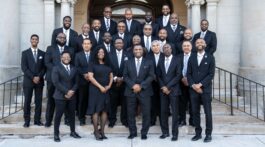When Jacob took his two wives, and his many flocks and herds, away from Paran and his father-in-law, Laban, he came to the river Jabbok. Hearing that his estranged brother, Esau, was coming toward him with 400 armed men, Jacob encamped his wives, flocks, children, and servants, in a defensive posture and went down to the river Jabbok to pray. There, he encountered a stranger in the dark, and the two began to wrestle wordlessly. The struggle went on all night, and just as dawn broke Jacob realized he was wrestling with an angel. When his opponent told Jacob to release him, Jacob replied, “I will not let you go until you bless me.” The angel replied by giving Jacob the new name, Israel, which means, “He struggles with God,” and told Jacob that he had prevailed.
A Model for Bible Study
Perhaps it seems strange, but I’ve always use this as my model for studying the Bible. Once I engage a text, I refuse to let it go until it blesses me. This does not mean that all other activities cease. On the contrary, I may have several such “wrestling matches” going on at the same time, and some of them last for years. Some have lasted more than a decade. What it does mean is that I don’t give up the fight until I find meaning that illuminates the episode in which it occurs, does not violate any other principle I have learned from Scripture, and often expands my understanding and enriches my life. One example is the episode between Tamar and Judah in Genesis 38 (see my book, “For Such a Time,” for the results of that “wrestling match”).
A Contest with Rules
-
Rule: The Author Was Inspired, I’m Not
-
What Inspiration Is, and Is Not
-
Inspiration: Not What I Thought it Was
-
Remember Who Is In Charge
Of course, in any wrestling match, there have to be rules. When wrestling with the text, the danger is that we will injure the true meaning of the text, distort or falsify part of our faith, and deceive both ourselves and others. In order to prevent those potentially dangerous mistakes, there must be rules that we follow. And as we shall see, it is important not only that we establish such rules for ourselves, but also that we announce those rules to others so that they may help validate our conclusions by understanding the process we’ve used, and at the same time holding us accountable to those rules.
Rule: The Author Was Inspired, I’m Not
The first wrestling rule is “The author was inspired, I’m not.” That may seem obvious, but often we interpret the Scriptures as if it were the other way around, as if we are the authority, and it is up to us to decide the significance and meaning of the text. But that is exactly backwards. God communicated to the inspired author something so important that he took the time to write it down so that first his contemporary audience, and then generations to follow, might understand God’s intentions in the matter. Finding out what God intended to communicate through this process is our task. If we already knew, then there’s no point in pursuing the matter. So we must begin with the recognition that we are the third party recipient, not the initiator of this communication.
What Inspiration Is, and Is Not
“Inspiration” means that the author had an experience with God you and I have not had. When I was younger, I thought that inspiration essentially meant that the authors were God’s stenographers – that they essentially wrote down whatever He told them, but inspiration is far more complex than that. While there may be a few cases of this in Scripture, for example, in the book Revelation, where John is told to “write this down,” it is not the universal experience of inspired writers. Indeed, the evidence of Scripture is the it is extremely rare. For example, Luke says that he thoroughly investigated everything, essentially doing the work of an historian or journalist. He says nothing about “God said this,” or “it was revealed to me.” To be clear, I’m not suggesting that Luke was not inspired. On the contrary I am simply reporting what Scripture says, and that it tells me inspiration is not necessarily what I thought it was.
Inspiration: Not What I Thought it Was
Similarly, the chroniclers in the Old Testament do not mention, nor do they seem all aware, of direct divine transmission of what they record. Yet they are not mere chroniclers like those of other kings and kingdoms; the history they record demonstrates a definite “God’s eye view” of events.The typical ancient chronicler praises their patron — after all, they worked for a King — listing all of his great accomplishments, whether roads and fortresses and monuments built, or enemies conquered and riches accumulated. They did not record their monarch’s faults or failures; that’s not what they were getting paid for. But the chroniclers in the Bible list the faults, even the crimes, of even their most famous and powerful subjects. Consider the scandalous and shameful episode of David and Bathsheba, or Solomon’s apostasy. And some monarchs, for example Jeroboam II of Israel, who accomplished great things in secular terms, but merits scant mention in scripture, because they had little or no effect on God’s plans for his people.
Remember Who Is In Charge
The Holy Spirit may enlighten, indeed Jesus promised that the Spirit would enlighten all those who come to the word seeking to know God’s will. But too often we come to the Word seeking words that will ratify our will, support our preferences. This first “Wrestling Rule” is designed to help us remember who is in charge.
There are several more rules, and we will take up another next week.










